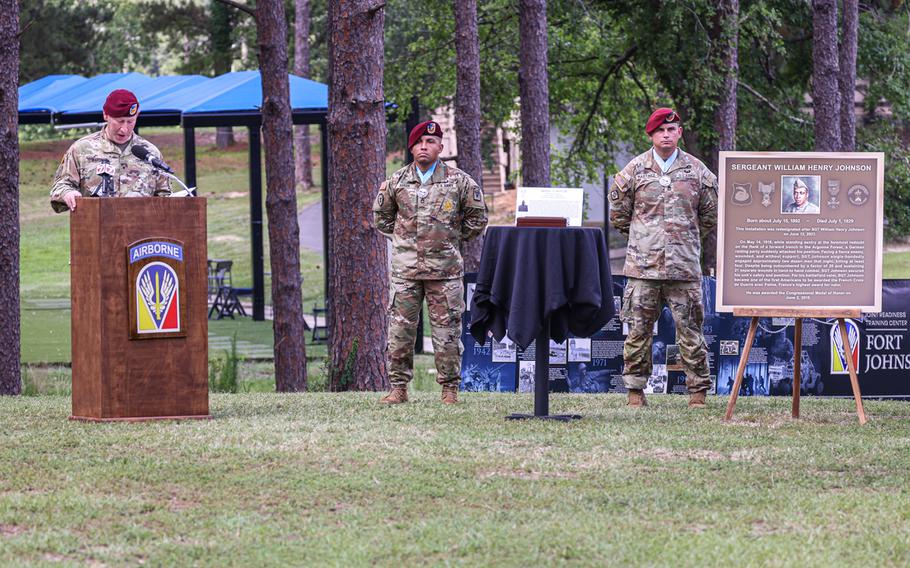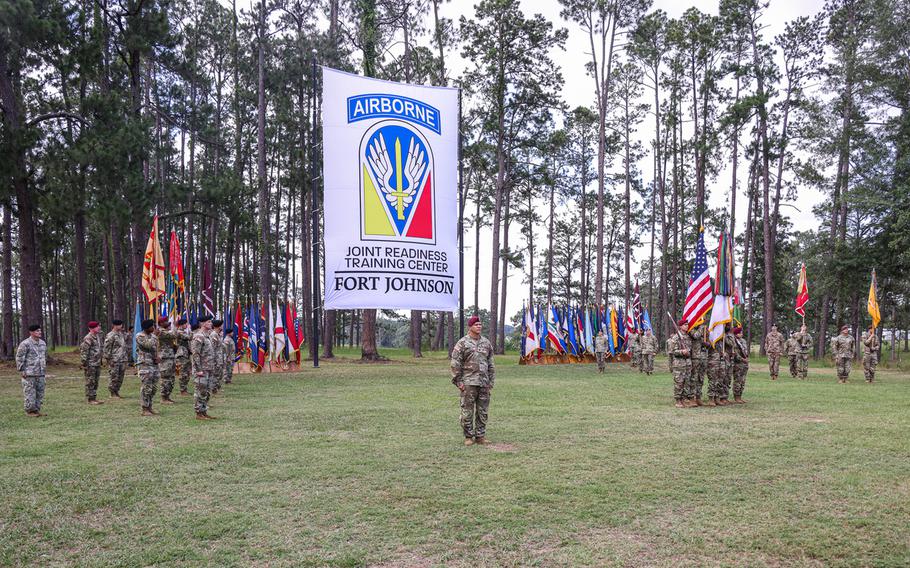
Fort Polk, La., was officially renamed Fort Johnson in a ceremony at the Army base on Tuesday, June 13, 2023. (U.S. Army )
With the striking of an anvil to symbolize the forging of the warrior spirit, the home of the Army’s Joint Readiness Training Center in Louisiana was officially renamed Tuesday from Fort Polk to Fort Johnson.
“At the heart of the warrior spirit lies courage, unwavering bravery to face danger head on, to stand firm in the face of adversity and to protect the freedoms we hold dear,” said Brig. Gen. David Gardner, the post’s commander. “If Sgt. William Henry Johnson doesn't exemplify the warrior spirit in its purest form, then I don't know who does.”
Born in North Carolina, Johnson moved to New York as a teenager and enlisted in the Army in June 1917. He was assigned to the 369th Infantry Regiment, an all-Black New York National Guard unit known as the Harlem Hellfighters.
Army Gen. Daniel Hokanson, chief of the National Guard Bureau, attended Tuesday's ceremony and said Johnson fought in World War I with the National Guard — the first war in which the organization was officially called the National Guard and was considered a professional military force. He thanked the commission tasked with renaming the Army’s nine installations for choosing a member of the National Guard for recognition.

Brig. Gen. David Gardner, commander of Fort Johnson, La., speaks during a ceremony on June 13, 2023, to rename the post from Fort Polk. Fort Johnson was selected to honor Sgt. William Henry Johnson, who was awarded the Medal of Honor for his actions in World War I. (U.S. Army )
“Fort Johnson is named after a citizen and a soldier,” Hokanson said. “It is a tribute to both his personal heroism with sacrifices made by so many to defend freedom.”
On May 14, 1918, Johnson was deployed to France where his unit was attached to a French unit in the Argonne Forest. At about 2 a.m., Johnson was standing guard when German forces attacked. With his fellow guard incapacitated, he sounded the alarm and attacked the enemy alone.
He threw his entire supply of grenades, then fired his rifle until his bullets ran out.
“He charged the enemy swinging his rifle as a club and when he observed two Germans about to carry his wounded comrade away for interrogation, Johnson abandoned his rifle and instead drew his bolo knife, fighting off the raiders in close quarters and pushing them back from the position,” Gardner said.
Johnson became one of the first American privates to receive the Croix du Guerre, France’s highest military honor. However, in the U.S., Black veterans did not receive equal recognition.

Sgt. William Henry Johnson fought in World War I with the 369th Infantry Regiment, an all-Black New York National Guard unit known as the Harlem Hellfighters. He was awarded the Medal of Honor in 2015 for his actions in combat in France on May 14, 1918. (U.S. Army )
Though Johnson was paraded through New York City as a hero after the war, his disability pension was denied and he died of his war wounds in 1929.
After his death, Johnson was awarded the Purple Heart in 1996, the Distinguished Service Cross in 2002, and the Medal of Honor in 2015. He is buried at Arlington National Cemetery in Virginia.
The Army did not establish Camp Polk in central Louisiana until January 1941. The post, which has always been used to train troops, closed for four years between World War II and the Korean War. In 1993, the Army moved the Joint Readiness Training Center from Fort Chaffee, Ark., to the installation.
Fort Johnson has a base population of about 32,350 and an average transient daily population of about 5,000 troops, according to the base. Aside from its training mission, Fort Johnson also is home to the 3rd Brigade Combat Team of the 10th Mountain Division. It is the seventh of nine Army installations to change its name in recent months to shed homage to a Confederate general.
Fort Pickett, Va., Fort Rucker, Ala., Fort Lee, Va., Fort Hood, Texas, Fort Benning, Ga., and Fort Bragg, N.C., have been renamed Fort Barfoot, Fort Novosel, Fort Gregg-Adams, Fort Cavazos, Fort Moore and Fort Liberty, respectively.
Fort Gordon in Georgia will become Fort Eisenhower in October. A date has yet to be scheduled for the change of Fort A.P. Hill in Virginia to Fort Walker.
Congress mandated the name changes in the 2021 National Defense Authorization Act, its annual Pentagon policy and spending priorities bill. It estimated the effort would cost some $62.5 million to complete. Outside of Army base names, the effort includes the renaming Confederate-linked items and names at dozens of other bases and Navy ships.

The Army renamed Fort Polk, La., to Fort Johnson on June 13, 2023, as part of an effort to rename nine installations named to honor Confederate generals. ( U.S. Army )
Earlier this year, the Louisiana National Guard announced it would rename the state-owned Camp Beauregard in Pineville to the Louisiana National Guard Training Center Pineville. The formal change will occur later this year.
Gardner closed Tuesday’s ceremony by pledging to continue the mission of training at Fort Johnson, just as it has for the past 80 years.
“The warrior spirit that burned within Sgt. William Henry Johnson now inspires generations of soldiers. Soldiers who will now call JRTC and Fort Johnson home, and soldiers who will continue to come here from all over the nation, and all the world, to train,” he said.